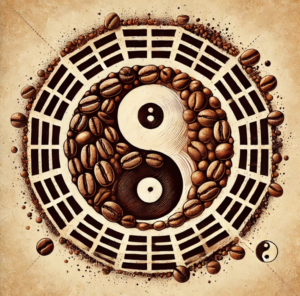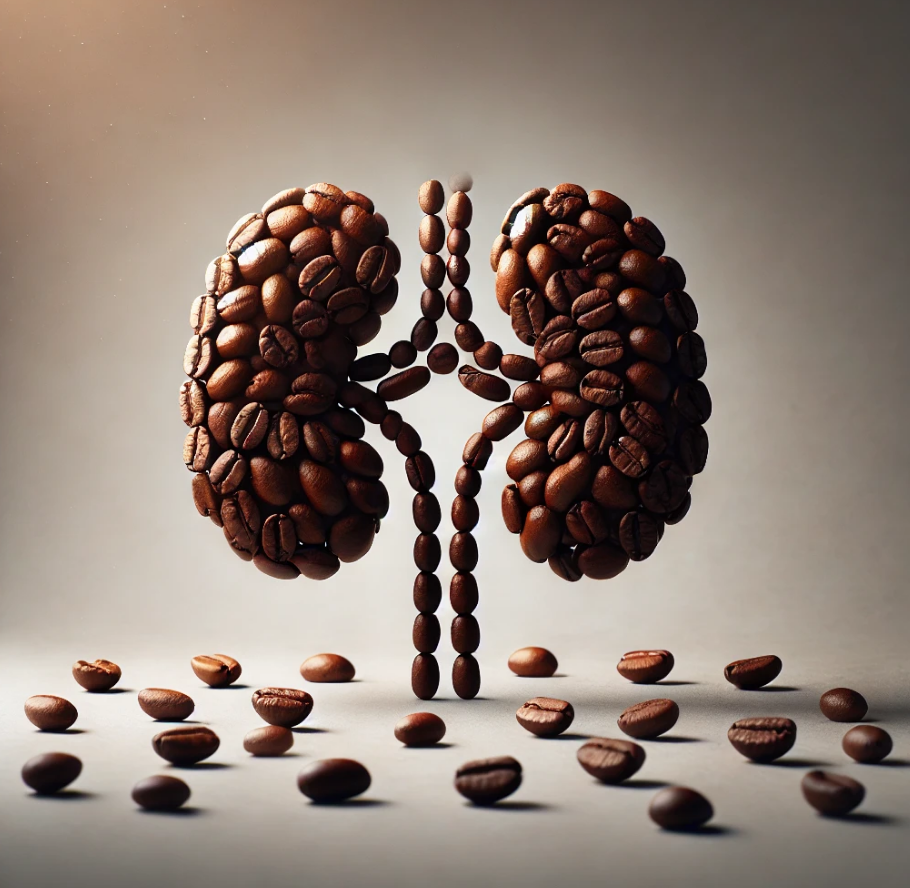Coffee, with its rich aroma and bold flavor, has become an essential part of many people’s daily routines and holds a prominent place in global culture.
However, have you ever wondered how coffee is viewed from the perspective of Eastern medicine? Is it a source of nourishment or a potential burden for your body?
Today, we’ll explore coffee’s properties and effects based on traditional Chinese medicine (TCM) and modern science, helping you enjoy coffee more healthily according to your body type and habits.

1. Coffee in TCM: A “Little Sun” That Warms and Energizes
In traditional Chinese medicine, coffee is considered warm in nature with a complex flavor profile—bitter, sweet, and slightly sour.
- Bitter taste: Clears heat, dries dampness, and dispels toxins.
- Sweet taste: Benefits the spleen and provides nourishment and balance.
- Aromatic nature: Stimulates the spleen and invigorates mental alertness.
This suggests that coffee can strengthen the spleen, dispel dampness, and boost yang energy, making it suitable for individuals with cold and damp body constitutions or yang deficiency. For example:
- Morning fatigue or swelling: Coffee can reduce puffiness and restore energy.
- Cold hands and feet or sensitivity to cold: Moderate coffee intake helps warm the body and improve circulation.

1. Coffee in TCM: A “Little Sun” That Warms and Energizes
In traditional Chinese medicine, coffee is considered warm in nature with a complex flavor profile—bitter, sweet, and slightly sour.
- Bitter taste: Clears heat, dries dampness, and dispels toxins.
- Sweet taste: Benefits the spleen and provides nourishment and balance.
- Aromatic nature: Stimulates the spleen and invigorates mental alertness.
This suggests that coffee can strengthen the spleen, dispel dampness, and boost yang energy, making it suitable for individuals with cold and damp body constitutions or yang deficiency. For example:
- Morning fatigue or swelling: Coffee can reduce puffiness and restore energy.
- Cold hands and feet or sensitivity to cold: Moderate coffee intake helps warm the body and improve circulation.
2. Coffee During Lunch Breaks: The Science and TCM Connection
Why is coffee so popular during lunch breaks?
Modern Science Explanation:
- Stimulates the nervous system – Boosts alertness and focus.
- Enhances metabolism – Aids in calorie burning and digestion after meals.
- Rich in antioxidants – Reduces oxidative stress and strengthens immunity.
TCM Explanation:
- Midday (11:00 AM–1:00 PM) is the time when yang energy peaks and coffee can further amplify this energy, sustaining physical vitality.
- Its warm and drying properties help eliminate dampness, reduce bloating, and aid digestion.
Recommendations:
- Drink 30–60 minutes after meals – Avoid interfering with stomach acid production and promote digestion.
- Moderation is key – 1 cup (200–300 ml) is sufficient to energize without causing palpitations or insomnia.
- Avoid coffee after 5:00 PM – As yang energy starts to decline, drinking coffee too late may disrupt its natural rhythm and affect sleep.
3. Does Coffee Harm the Kidneys? Debunking Myths
TCM Perspective: Warming the Kidneys
Coffee beans resemble the kidneys in shape and are black—associated with the kidneys in TCM’s Five Elements theory. Coffee supports warming kidney yang and promotes fluid metabolism, which explains the diuretic effect (frequent urination) after consumption.
Key Notes:
- Coffee doesn’t nourish the kidneys but rather activates kidney yang temporarily. Overconsumption may deplete kidney essence, leading to fatigue, lower back soreness, or poor sleep.
Modern Science Perspective:
Studies indicate moderate coffee intake does not harm kidney function and may even reduce the risk of chronic kidney disease. However, individuals with kidney disease or high blood pressure should limit caffeine intake to avoid added strain.

4. Who Should and Shouldn’t Drink Coffee?
Recommended for:
- Cold and damp body types – People with cold hands, fatigue, or water retention.
- Digestive issues – Coffee can boost digestion and relieve constipation.
- High-focus activities – Professionals or students needing concentration.
Not recommended for:
- Yin-deficient and overheated individuals – Prone to dry mouth, restlessness, insomnia, or constipation.
- Weak spleen and stomach – Those with acid reflux, bloating, or indigestion.
- Pregnant women or heart disease patients – Caffeine intake should be carefully controlled.
5. Healthy Coffee Pairings for Balance
To enjoy coffee more healthily, consider these pairings:
- Milk or oat milk – Neutralizes coffee’s warming properties, ideal for those with weak digestion.
- Cinnamon powder – Enhances kidney yang, suitable for cold-prone individuals.
- Honey or coconut milk – Soothes dryness and supports digestion.
- Hot coffee over iced coffee – Cold beverages may worsen cold constitutions, so hot coffee is better for warmth.
6. Conclusion: Finding the Right Balance
Coffee is more than just a pick-me-up—it carries complex properties that boost yang energy, dry dampness, and strengthen the spleen. However, drinking it moderately and tailoring your habits to your constitution are key.
Based on both Eastern medicine and modern science, you can fine-tune your coffee habits:
- Drink morning coffee to reduce bloating and fatigue.
- Enjoy a lunchtime coffee to refresh your energy, but avoid drinking after 5 PM to preserve sleep quality.
- Pair coffee with milk or cinnamon to balance its effects.
Food and beverages aren’t inherently good or bad—it’s all about aligning them with your body’s needs. Discover what works best for you, and you can enjoy the health and vitality that coffee offers!
TCM Insights: The Body’s Daily Rhythm and Energy Flow
Morning (5:00 AM–11:00 AM) – Yang energy rises, suitable for activity and focus.
Midday (11:00 AM–1:00 PM) – Yang energy peaks, the most productive period.
Afternoon (1:00 PM–5:00 PM) – Yang energy stabilizes and gradually declines.
Evening (5:00 PM–7:00 PM) – Yang energy begins to collect and prepare for rest.
Night (7:00 PM–11:00 PM) – Yin energy dominates, promoting recovery and repair.
Early Morning (11:00 PM–3:00 AM) – Yin energy reaches its peak, and yang energy subtly regenerates.
Why Avoid Coffee After 5 PM?
- Yang energy starts to decline – Drinking coffee at this time may disrupt the natural balance of yin and yang, leading to restlessness and insomnia.
- Caffeine lasts 3–6 hours – Its effects may persist into the night, interfering with deep sleep cycles.
- Interrupts the “storage phase” – According to TCM, nighttime is when the body recharges and nourishes itself. Excess yang stimulation can drain energy reserves.
Ideal Coffee Drinking Times
- 9:00 AM–11:00 AM – Supports rising yang energy, boosts focus.
- 12:00 PM–2:00 PM – Aids digestion and replenishes midday energy.
- 3:00 PM–4:30 PM – Provides a light energy boost if needed, but avoid excessive amounts.
Final Tips:
- Avoid coffee after 5 PM to support natural energy cycles and sleep.
- Consider herbal teas like red date or goji berry water for evening energy without disrupting rest.
- For late-night work, choose low-caffeine or decaf coffee to reduce stimulation.
Further Reading and References
For more insights into the health benefits and cultural significance of coffee, explore the following articles:
研究表明经常喝咖啡对你有好处 – 世界经济论坛 (World Economic Forum)
喝咖啡有益健康?专家解答常见疑问 – 联合早报 (Zaobao)
喝咖啡能降低死亡风险? – 纽约时报 (The New York Times)
咖啡健康科普 – 吉林省卫生健康委员会 (Health Commission of Jilin Province)
